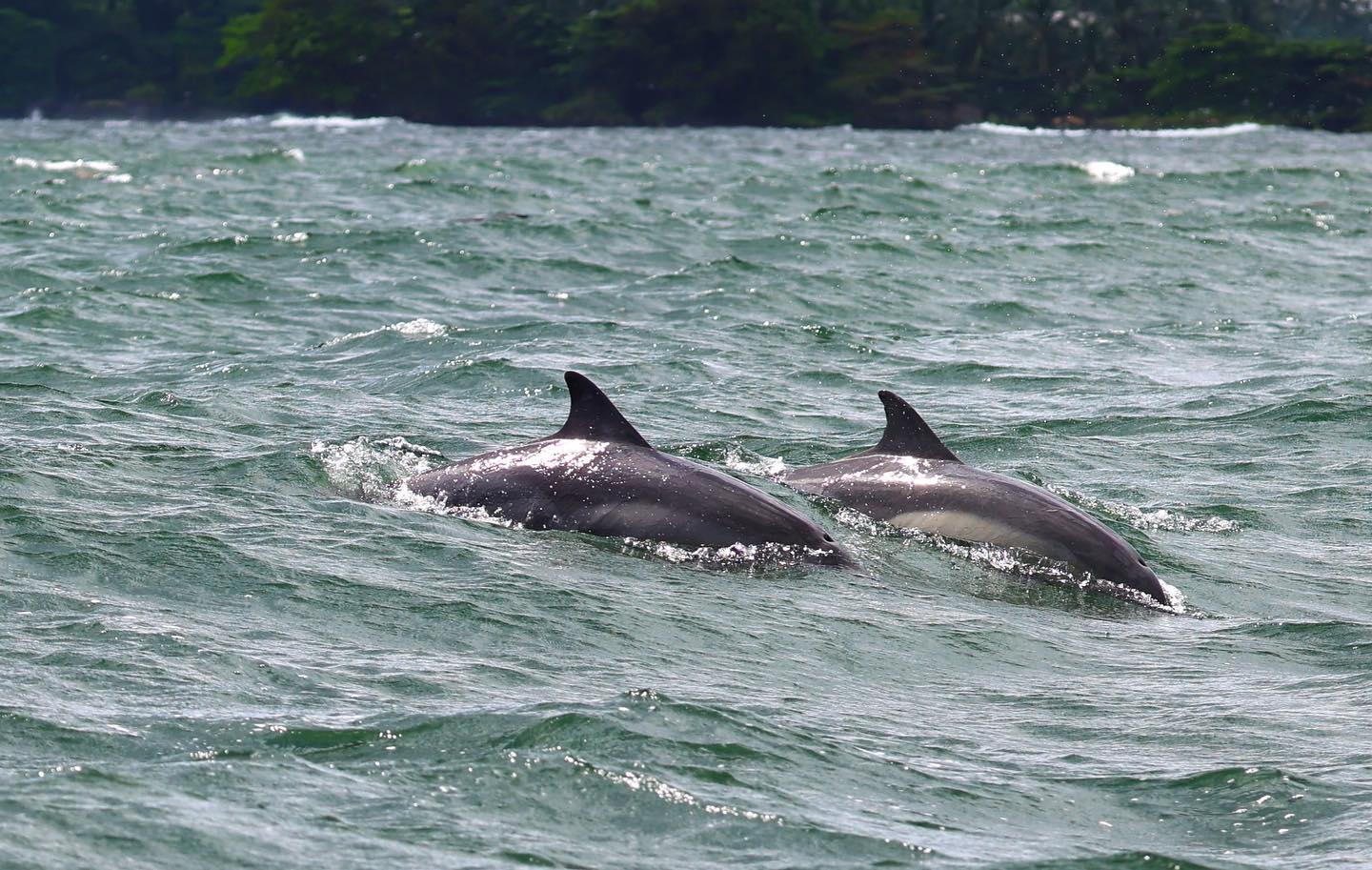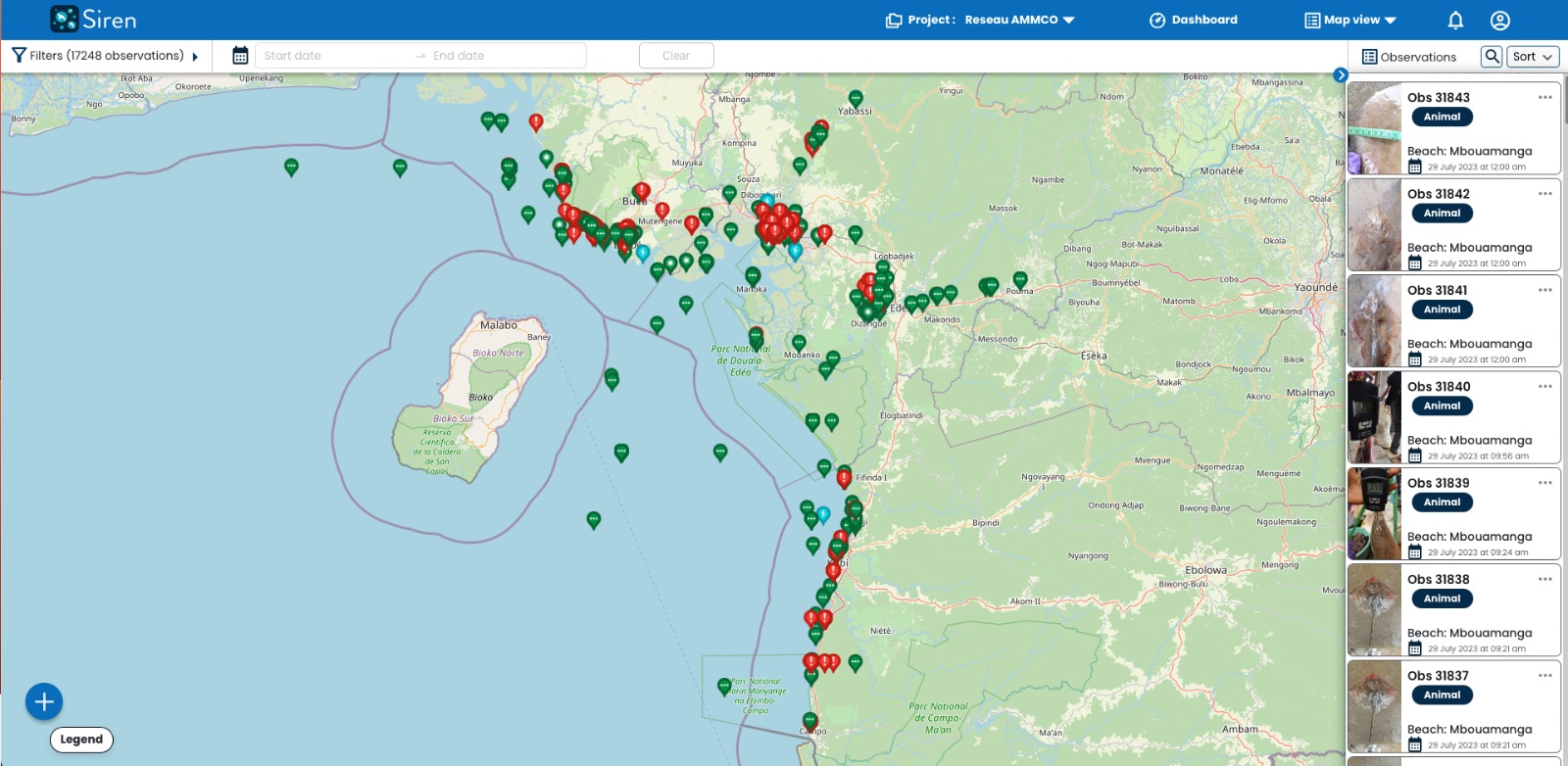Smartphone App promotes citizen science to address data gaps in Cameroon and beyond

Image of a bycaught humpback dolphin reported through the Siren Smartphone App in Cameroon.
CCAHD partner, the African Marine Mammal Conservation Organization (AMMCO) has been working for 10 years to document marine mammal occurrence and threats in Cameroon and more widely in Central and West Africa. These years of work revealed that many marine mammal species, including Atlantic humpback dolphins and African manatees are threatened by poaching, habitat degradation and accidental capture in fisheries.
However, much of the available data is based on incidental reports and/or one-off surveys, and information on species distribution and threats is so limited throughout most of the Sousa teuszii range, that insufficient scientific knowledge hinders conservation actions and management decisions. Throughout the Sousa teuszii range, fishing activity is primarily focused within nearshore waters and close to river estuaries and reef structures that support productive coastal ecosystems. These productive fishing grounds often overlap with essential habitat or migratory corridors of marine mammals. While this overlap creates a risk of negative fisheries interactions, including accidental entanglement in fishing gear, it also places fisherfolk in a prime position to document and report marine mammal sightings. Scientific field surveys are costly, and limited in time and the area they can cover. Furthermore, research requires advanced equipment and skills that are not always available within the region.
AMMCO recognised that fishers, who share habitats and resources with marine mammals have the potential to be valuable collaborators and citizen scientists. This inspired AMMCO to establish a network of fisherfolk to report sightings. The first model of this network relied on paper sheets that fishers used to record and report information. However, paper poses challenges in marine environments, including transcribing errors, inaccuracy of GPS locations and data loss before it is effectively archived and analyzed. To address these challenges, AMMCO developed a Smartphone App called SIREN. The App allows fishermen to use their phone to take and upload up to four photographs of the sighting, and with just a few additional clicks, to provide additional valuable information, including a description of the environment and. The SIREN app automatically records the location and the date. SIREN is a user-friendly app designed to work on Android and iOS operating systems, with a web interface where observational data are uploaded for visualisation and project management.
Once collected and uploaded to the SIREN website by field observers, scientists, non-governmental organisations (NGO), government agencies, managers, and stakeholders (including fisherfolk) are able to visualise and analyse the aggregated data to inform marine mammal management practices. The sustainability of the SIREN App is ensured by the regular maintenance and updates on the app, increasing accessibility and ease of use as technology improves globally. Collecting this information does not require immediate wireless data access; information collected can be saved locally on the phone until internet access is available to upload to the server.
To date, SIREN has helped document more than 20,000 observations since 2014, encompassing over 300 aquatic species, including 13 marine mammal species, including 2 incidents of bycatch of Atlantic humpback dolphins in a part of Cameroon’s coastline where they had never been documented before. The data collected have assisted the Cameroon government in updating the National Law of Forestry and Wildlife, adding four marine mammal species to the list of fully protected species in Cameroon. Through their participation fishers have developed a greater awareness of marine mammals and the threats they face, fostering a sense of shared responsibility for their protection, with some fisherfolk becoming ambassadors of marine wildlife in the region.
The database of marine animal observations has been, and continues to be, instrumental in creating a catalogue of marine biodiversity for the poorly studied coast of Cameroon. Recently, the National Geographic Society provided a grant that will allow AMMCO to to share the tool in other countries in the Sousa teuszii range. Thanks to this funding, AMMCO is available to provide training, support and monitoring to organizations who wish to use the SIREN platform to support their own national marine mammal reporting networks. It is important to note that using the tool does not automatically create a publicly available dataset that AMMCO or other stakeholders can see. Partners who adopt Siren for use in their own countries, will create their own unique ‘projects’, secured by a password, and each participating organization will be able to determine who will have access to the data that is collected and how it is shared and used for conservation management.
Are you interested in using SIREN within your organisation or country? Learn more here: : https://marine-mammals.info/wp-content/uploads/2023/11/Good-practice-SIREN-AMMCO-v2.pdf or contact AMMCO by email: info@ammco.org

Common dolphins observed off the coast of Cameroon

A map of observations reported in Cameroon through the SIREN Smartphone App
